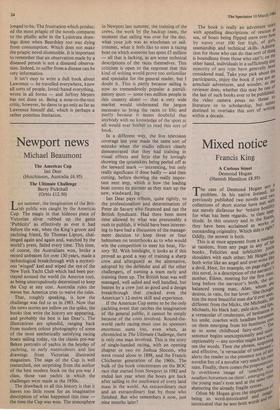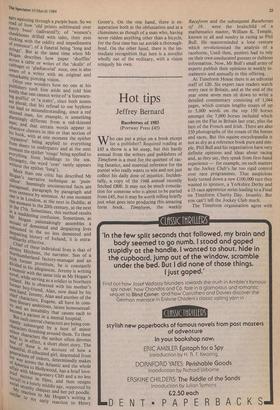Mixed notice
Francis King
The case of Desmond Hogan seish!s problem. In his native Ireland, previously published two novels and tw° collections of short stories have met with not merely disfavour bu* ierisive ho stilitY for what has been regardes as their ineP' titude. In this country and in the Statesi they have been acclaimed as works 2,7 outstanding originality. Which side is rig' Oddly, the answer is both. This is at once apparent from a feat:174 at random, from any page in any °I his books. Felicities and infelicities Iosan` shoulders with each other; Mr Hogafi„ like both write like an angel and over-Writ ht a devil. Here, for example, on page aerator's this novel, is a description of then arratore, mother, Eileen, meeting for the first thrla. long before the narrator's birth, the -sbe balanced young man, Alan, wh°,_111,„gM desires, in vain, for her lover: 'She tiiu—e, him the most beautiful man she'd ever, ct-be different from the Micks, the Micheas'i:ns Michaels, his black hair, pale skin, red if; a vernacular of tenderness, of hesitatinnen his smile, coaches with headless horsefilyes on them emerging from his luminoti,s eve as in some childhood fairy-story- _.„„, sentence begins unexceptionally and tiviiirTi, ceptionably — any novelist might have siog ten the words. Then the phrase, suss', and effective, 'a vernacular of tendertliany alerts the reader to thepresence not ° novelist but of a novelist very much h is -us' man. Finally, there comes the prepostersv:ito ly overblown image of 'coaches from neadless horsemen on them', emerging time the young man's eyes and at the same shattering the already fragile syntax' of Often Mr Hogan gives the irnPres.mage- being so word-intoxicated and In-ci jai" intoxicated that he sees both words a- readglintingthrough a purple haze. So we of how 'old priests sublimated over merrY buns' (salivated?); of `women's cheekbones drilled with tales, their eyes choking with the oddity and impedimenta of existence'; of a funeral being 'long and stringy'. But at the same time when Mr Hogan describes how paper 'shuffles, across a table or writes of the 'skulls' of cabbages or 'gladiatorial' mice, one is also aware of a writer with an original and remarkably piercing vision.
Often one wonders how no one at his Publishers took him aside and told him kindly that one cannot write of 'a forewarn- ing graffiti' or 'a stairs', since both nouns are plural; that his refusal to use hyphens can lead to misunderstanding, since a red skinned man, for example, is something alanningly different from a red-skinned man; and that certain words appear in obsessive clusters in this or that section of his book, with at one moment the epithet ,expansive' being applied to everything rom sheets to underpants and at the next Moment the epithet 'rouge' being applied to everything from buildings to the sea. (Strangely, the word 'coat' rarely appears without the epithet 'long').
More than one critic has described Mr Hogan's narrative technique as Poin- tiiiisre'. Seemingly unconnected facts are juxtaposed, paragraph by paragraph and even sentence by sentence. At one moment one is in London, at the next in Dublin; at °Ile moment in the 20th century, at the next in the 17th. Sometimes, this method results .111 a maddening confusion. Sometimes, as wir Hogan painstakingly assembles a Mosaic of demented and despairing lives subsumed in the no less demented and e,sp, airing history of Ireland, it is extra- ordinarily effective. . Chief of these individual lives is that of Jeremy Hitchens, the narrator. Son of a 1,.orkthumberland factory-manager and an .'s' former prostitute, he is constantly amivided in his allegiances. Jeremy is writing memoir with the same title as Mr Hogan's ulrov, el, while serving as a soldier in Northern eland. He is obsessed with his mother's "ormer boy-friend, Alan, now dead by his Chief characters, Eugene, all have in corn- in on literary ambitions, latent homosexual- bl and an instability that causes each to '''nrne a patient in a mental hospital. s. uut such central characters are being con- i'antlY submerged by a host of minor _Lliaracters threshing around them. To these what characterseuaracters the author often devotes is. in effect, a short short story. The best Of these is an account of how a gentitifUl, ill-educated girl, descended from herewrations of tinkers, determinedly makes of Pt." 4Yr
accartoss the Atlantic and the whole
affair • 0 Hollywood, has a brief love- brief With Montgomery Clift and a no less herself films, and then resigns to a lo s • nely middle age, supported by 14, ecuntY cheques and her pet poodle. similar eaction t o Mr Hogan's writing is .,ar t„
early reaction to Henry Green's. On the one hand, there is ex- asperation both at the obfuscation and at a clumsiness as though of a man who, having never ridden anything other than a bicycle, for the first time has sat astride a thorough- bred. On the other hand, there is the im- mediate recognition that here is a novelist wholly out of the ordinary, with a vision uniquely his own.







































 Previous page
Previous page